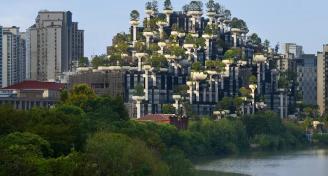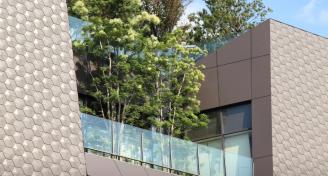Urban Agriculture Benefits
Urban and suburban agriculture takes place in and around the border of the world cities, including agriculture, animal husbandry, fish culture and tree planting in urban areas. It also includes non-consumable products such as ecological services. Urban agriculture is not the only gardening in the city; it is an important component of many cities. The main role of nutrition in the life, health, culture, and the environment are the most important urban issues in human society.
A connection between urban agriculture and keep urban runoff, food insecurity, urban heat island effect, energy efficiency, air quality, and climate change, quality of life in residential areas, social isolation and preventing crime has been documented. Based on a program that runs as food for townspeople by FAO, it helped citizens to involve in the production of food and feed themselves. The majority of these programs include the use of lands and green urban environment spaces in the production of fruits and vegetables in apartments.
Various aspects of urban agriculture in vacant lands within the city, balconies, walls, rooftops, and streets that are visible in many developed and developing countries such as Cuba, the United Kingdom, Australia, Switzerland and etc. The following considers aspects of ecology, social and economic urban agriculture sustainability. Urban agriculture can bring many benefits in three main categories including:
The ecological benefits:
Restoration of biodiversity is one of the important environmental benefits of urban agriculture. Urban agriculture with producing different products can have interaction in the production of special products. In addition, urban agriculture helps to protect endangered or scarce species, fruits, vegetables, flowers, and shrubs. If urban agriculture is planned in a suitable way and integrated with the urban design, it can provide a pleasant space for citizens. Furthermore, green spaces around apartment blocks and houses, help to improve climate, because it can increase moisture, reduce temperature and provided a pleasant smell in the city; absorb dust particles and gases from polluted air through the foliage of trees and plants, broken wind speed, buffer solar radiation and create shade. Urban agriculture also improves air quality by removing pollutants which are in the air such as chemicals and allergens like pollen. Noise pollution in urban areas is usually common as a result of increased density, heavy traffic and a lot of hard surfaces. Urban agriculture, especially green roofs and vertical gardens are very effective in reducing noise pollution in urban areas. This noise reduction is due to the absorption of sound waves through the soil and plants.
The economic benefits:
Urban agriculture has several economic benefits to society. Urban gardens can promote economic development and tourism. The gardens will attract businesses and residents and are catalysts for business development and promotion of city life. In studies of urban gardens, was determined that they improve ideality of residential and commercial areas and increased value of the property. Urban agriculture can also create local employment and income. A study shows that agriculture with 6% covering annually Toronto buildings, directly and indirectly, will provide jobs for about 1,350 people. In addition, the commercial value of products in annual urban agriculture will be about 5.5 million dollars. Food markets and price paid for such products can affect the size and nature of food products. Urban agriculture is a local potential to create local economic activities and if the performance is good it has the ability to attract investors. Food production in urban regions and areas close to them creates this opportunity that food chain associated with the production-consumption become limited. Organic household waste can be turned into fertilizer and used in gardens and fields. This process brings ecological and economic savings. In third-world cities, due to three factors: experience (rural migrants experience in agriculture), requirement (a large number of unemployed and informal workers) and opportunities (marginal agricultural areas and arid lands within the City are provided acceptable reasons for the development of urban agriculture and preservation of green areas.
The social benefits:
The social dimension of urban agriculture has several factors that mentioned in the following:
1. Increasing physical activity: In societies where obesity is a problem, urban gardens provide an opportunity for residents to increase their physical activity through gardening.
2. Health (garden therapy): Psychological studies have shown that the effects of landscape renewal, speedup health improvement of a person. A variety of sounds smells, and colors of the plants can have significant effects on the health and welfare of people. Access to healthy and fresh food is also one of the important issues; urban agriculture emphasizes the existence and availability of food. In Uganda, more than 60 percent of the food consumed by low-incomes is produced by them. Ecology psychologists study the relationship between psychological stress and the characteristics of the urban landscape in two approaches. The first approach is the belief in the healing of nature and impact of the plant on the intellectual and psychological pressures. The second approach is the health landscape, the landscape therapist takes a wide variety of landscapes. That experience of each can play a vital role in improving human health, may include personal experiences. So the landscape is a good memory that is a personal past, or a collective and cultural past is a landscape therapist.
3. Increased security: Crime reduction has been observed in communities that have urban gardens. People who have spent their time in urban gardens are reluctant to commit the crime. Urban gardens also provide a safe environment for the residents, especially children.
4. Green space of community and aesthetic values: Urban agriculture can improve the aesthetic values and provide more exterior space for residents and visitors. Vertical gardens provide a quiet and pleasant environment for residents.





